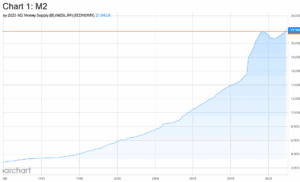Click Here to Listen to the full discussion
On this episode of Behind the Markets, we had the pleasure of being able to speak with Professor Dr. Wim Schoutens from the University of Leuven in Belgium. Professor Schoutens has a wide range of expertise, including such areas as financial mathematics, cryptocurrencies and blockchain, machine learning and more. He is also an independent expert advisor to the European Commission.
The focus of our discussion with Professor Schoutens was on the recent happenings in the contingent convertible (Coco) bond market, especially considering the takeover of Credit Suisse by UBS at the behest of Swiss regulators, as well as the wiping out of roughly $17 billion of Coco bond issuance. Many global investors are seeking to update their thinking as to whether this was truly a “one-off” situation or if they need to incorporate into their forecasts the possibility that governments or regulators may have a more flexible interpretation of certain rules in future crises.
Professor Schoutens did indicate that after the global financial crisis of 2008–2009, he was involved in quite a bit of discussion on ways to possibly reform certain parts of the financial system. It was clear to him that regulators were thinking about a new kind of instrument. Their motivation was to better protect taxpayers in case of another future financial crisis. Interestingly, the Swiss were at the forefront of some of this thinking, and they came up with a regulation that basically introduced Cocos to the market.
At that point, coming out of the global financial crisis, if Switzerland was taking action, then others were looking to follow suit. There were many discussions around this time, and Professor Schoutens was there and investigating the possibility of a security that ultimately looked like the Coco bond. He was among those writing some of the first papers and books on the topic.
Now, a Coco is in the category of security that we think of as a “hybrid,” meaning that it is not exactly equity and it is not exactly a bond—it has characteristics of each. For instance, typical bonds will have a date of maturity, i.e., a 10-Year bond matures in 10 years, and the principal is paid back to the bondholder. A Coco, like an equity security, has no such maturity date and is often referenced as “perpetual.” But there are coupon payments, and Professor Schoutens, along with his PhD students, was seeking to develop some pricing models to better think about managing the risk of these types of securities.
The current situation relating to Credit Suisse got a lot of attention because banks, and really, companies in general, have a capital structure. Usually, equity holders are at the bottom, meaning that they have a lot of opportunities for upside in good times, but on the other hand, they must be ready to take the biggest share of the losses on the downside. Many investors think about this hierarchy of different securities when making investments, especially in certain styles of fixed income investments like distressed debt.
There is no dispute that, in a depiction of the capital structure of Credit Suisse, the Coco bonds were higher than the equity. However, what surprised many is that the Coco bonds were written down to a value of $0 while the equity securities maintained at least some value. Many would have expected that before the Coco bonds would be written down to $0, the value of Credit Suisse equity would have also been written down to $0.
Professor Schoutens indicated that certain provisions that would have allowed for this would have been in the small letters of the contract and, in his view, should not be possible in the other parts of the European market beyond Switzerland. In other European countries, this could not have happened.
It was so clear that European regulators outside of Switzerland were not happy with this because it turned around the logical balance sheet structure, where equity holders take the first losses and have the highest risk. Professor Schoutens also said that even in Belgian newspapers—and he noted that Belgium is far from a major global financial hub—opinions were indicating that Switzerland can no longer be trusted because their government and regulators have upended the essential rules of finance and ordering of risk within the capital structure.
It looks like there will be certain court cases coming on this matter, brought by global bond investors and other large asset managers, so we will have to see what types of settlements are or are not achieved or if other important precedents are set from a legal standpoint.
Professor Schoutens did indicate that, in his view, European banks are well capitalized, as another aspect of the discussion regards whether what happened with Credit Suisse indicates there is just greater risk in the system and there could be contagion. In his opinion, it cannot be ignored that the perception of Credit Suisse from a profitability and risk management perspective was not great, and as we write these words, there may be added pressure on Deutsche Bank, another case where the reputation for risk management has not been pristine.
Professor Schoutens noted that part of the discussion around Credit Suisse included some large Saudi Arabian shareholders becoming more reticent to increase their equity positions. In his view, with some of these banks that have had questionable reputations in recent years, it is tougher and tougher to initiate that equity investment in the long run.
Another discussion important for banks in 2023 regards the fact that we have—in most jurisdictions—exited the “zero interest rate” world. Savings accounts and checking deposits, at least in theory, should no longer be associated with zero interest rates. Deposit holders may see the interest rate available on other types of very low-risk accounts, and they may tend to hold lower and lower balances at banks if they seek to maximize some of those interest rates that they can get with relatively low risk.
Professor Schoutens, at least so far, recognizes that this is a behavioral force present in the markets today. While he does not currently see evidence or indications that Europeans will tend to move away from banks and toward other types of low-risk accounts in droves, this could change. What’s more important is how easy it has become to electronically move money from one account to another. The look and feel of a “bank run” or a “loss of confidence” is totally different. The speed with which a bank could go from “okay” to “defunct” status is probably faster than at any prior point in history.
Finally, since Professor Schoutens was involved in some of the early modeling and valuation studies of Coco bonds, we discussed what he sees today. It is clear that yields are high, but risk is also high. If we go down one path where, week by week, we see different “runs” on European banks, then there could be greater and greater concerns around Coco bonds. However, if the tone of the market changes, and we are able to get beyond the more immediate concerns, and the fact that banks look well capitalized is able to carry the day, then the forward-looking returns from these levels of yield could be attractive—we just note that these securities certainly have unique risks as well as sensitivities to European regulators that other securities may not.
—
Originally Posted April 3, 2023 – Behind the Markets Podcast: What Do Contingent Convertible Bonds (Cocos) Tell Us about the Possibilities of Further Bank Crises in Europe?
Disclosure: WisdomTree U.S.
Investors should carefully consider the investment objectives, risks, charges and expenses of the Funds before investing. U.S. investors only: To obtain a prospectus containing this and other important information, please call 866.909.WISE (9473) or click here to view or download a prospectus online. Read the prospectus carefully before you invest. There are risks involved with investing, including the possible loss of principal. Past performance does not guarantee future results.
You cannot invest directly in an index.
Foreign investing involves currency, political and economic risk. Funds focusing on a single country, sector and/or funds that emphasize investments in smaller companies may experience greater price volatility. Investments in emerging markets, real estate, currency, fixed income and alternative investments include additional risks. Due to the investment strategy of certain Funds, they may make higher capital gain distributions than other ETFs. Please see prospectus for discussion of risks.
WisdomTree Funds are distributed by Foreside Fund Services, LLC, in the U.S. only.
Interactive Advisors offers two portfolios powered by WisdomTree: the WisdomTree Aggressive and WisdomTree Moderately Aggressive with Alts portfolios.
Disclosure: Interactive Brokers Third Party
Information posted on IBKR Campus that is provided by third-parties does NOT constitute a recommendation that you should contract for the services of that third party. Third-party participants who contribute to IBKR Campus are independent of Interactive Brokers and Interactive Brokers does not make any representations or warranties concerning the services offered, their past or future performance, or the accuracy of the information provided by the third party. Past performance is no guarantee of future results.
This material is from WisdomTree U.S. and is being posted with its permission. The views expressed in this material are solely those of the author and/or WisdomTree U.S. and Interactive Brokers is not endorsing or recommending any investment or trading discussed in the material. This material is not and should not be construed as an offer to buy or sell any security. It should not be construed as research or investment advice or a recommendation to buy, sell or hold any security or commodity. This material does not and is not intended to take into account the particular financial conditions, investment objectives or requirements of individual customers. Before acting on this material, you should consider whether it is suitable for your particular circumstances and, as necessary, seek professional advice.
Disclosure: Alternative Investments
Alternative investments can be highly illiquid, are speculative and may not be suitable for all investors. Investing in Alternative investments is only intended for experienced and sophisticated investors who have a high risk tolerance. Investors should carefully review and consider potential risks before investing. Significant risks may include but are not limited to the loss of all or a portion of an investment due to leverage; lack of liquidity; volatility of returns; restrictions on transferring of interests in a fund; lower diversification; complex tax structures; reduced regulation and higher fees.
Disclosure: Bitcoin Futures
TRADING IN BITCOIN FUTURES IS ESPECIALLY RISKY AND IS ONLY FOR CLIENTS WITH A HIGH RISK TOLERANCE AND THE FINANCIAL ABILITY TO SUSTAIN LOSSES. More information about the risk of trading Bitcoin products can be found on the IBKR website. If you're new to bitcoin, or futures in general, see Introduction to Bitcoin Futures.




















Join The Conversation
For specific platform feedback and suggestions, please submit it directly to our team using these instructions.
If you have an account-specific question or concern, please reach out to Client Services.
We encourage you to look through our FAQs before posting. Your question may already be covered!